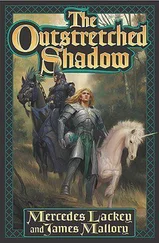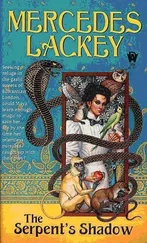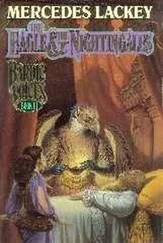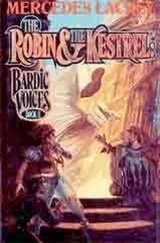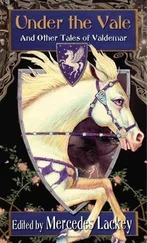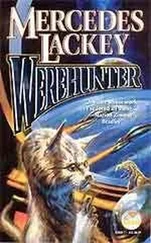As she turned the vessel with quick, skilled movements of her feet and oar, a movement caught the periphery of her vision. Someone up there . . . She'd forgotten about the watcher on the balcony of the Casa Brunelli.
He was watching, impassive. It was much lighter now, and she could see him as clearly as he could doubtless see her dripping self. The man was slight. Reddish haired, with dark eyebrows that met to form a forbidding line. A gaze like an eagle. It was not a face that you could forget. And it looked . . . implacable.
She sculled hard. It was not something which could be done too hastily, without ending up in the water. She nearly did that again.
"Why didn't he call out?" asked the wet Benito, once again huddled in the bow.
"One of life's little mysteries," snapped Katerina, trying to keep her teeth from chattering. Sculling was an exercise which could leave you pretty warm, but she still hadn't recovered from either the cold water or the fear. However, by the expression on the man's face, she was sure that the only reason he hadn't called out was that he didn't want to be seen himself.
The largest of San Marco's bells began to peal the dawn. When it was still, the Arsenal's Marangona bell began to sound. It would ring for some time, calling the shipwrights, carpenters, and caulkers to work. Venice was stirring. And Kat was a long way from home. She could hardly help being seen, wet. Well, at least she could get dry, and she had other clothes. She was probably better off than the boy. But her cargo was somewhere in the canal mud outside the Imperial embassy.
Bad.
She couldn't come back that evening, or the next. The Solstice Feast with its celebrations, ridottos, and balls would go on for two more days. She would just have to pray that the heavy parcel would not wash with the tide, and that the boy would keep his mouth shut.
Worse.
And because she had never learned to swim, she'd have to ask this shivering canal-brat to get it back for her.
Worst. Damnation!
Chapter 2 =========
It was a racasse. A scorpion-fish. The only catch of the day, and it had to be a Godforsaken racasse.
Marco Valdosta stared at the reed-woven fish trap. It was the best and newest one he owned. He stared at the contents, which flopped around getting its long, poisonous spines nicely wedged, then cursed a curse which was long, literate, and alliterative.
The words did not match the speaker. Benito's older brother was a painfully thin, ragged sixteen-year-old, dressed only in tattered breeches, balanced on his haunches on a scrap of raft cobbled together from waterlogged flotsam. A marsh-dweller--one of the mixture of destitutes, refugees, and criminals who scratched out a living among the islands, and the mosquito-singing Jesolo marshes to the northeast. The coastal lagoon that sheltered Venice was pleasant enough around the city but closer to the mainland, away from the cleansing ebb and flow, the marshes that fringed the lagoon were an ooze of thick stinking muds and stagnant, brackish waters. The townsfolk of Venice called the people who lived there "loco."
Marco looked it. His dark hair was nearly waist length, indifferently clean, and held back in a tail with a twist of marsh-grass; his lean tanned face was smudged with mud above the almond eyes and along the cheekbones. This was not the sort of creature from which one expected anything intelligible, much less intelligent.
Marco was flat out of patience, with the day (which was hot and stank), with his luck (which smelled almost as bad as the day), and with the world (which smelled worse than his luck). For anyone else on this muddy lagoon, for anyone else fishing between the quays of this sinking, stinking city, a racasse would be cause for rejoicing. They were fine eating. And you could sell the spines. There was always a market for poison. All you needed was a 'priest' to club the fish with, and some care. And--if it was stuck in a fish trap--a good long harpoon.
But Marco didn't have a harpoon. There was no way to kill the fish in that trap, short of clubbing the painstakingly woven structure to reed-splinters. He had a knife . . . of sorts. But it was no more than a splinter of stolen Murano glass, with one end dipped in a caulker's tar-bucket, and wrapped with string.
All he could do was to stare at the three-times-damned thing wedging itself more and more tightly in the depths of his fish trap and try not to cry. The only catch of the whole day, useless, and he hadn't eaten since yesterday morning. Damn the Saints and damn the trap. His only hope was the chance that the fish might relax when it died, enough to let him slide it out. Or if he could find a fisherman with a harpoon. He would lose half the value of his catch, but he might get something.
He poled the raft toward the wharves in hopes of finding a fisherman; there was just the barest possibility there would be someone there with a bit of a coin or something edible to trade--he'd willingly swap fish, trap and all for a little bread. He hadn't had any real bread in months.
Real bread--the smell of bread baking--used to drive him nearly out of his head. Mama would laugh at him--tell him he'd never be a fighter, he wasn't carnivore enough. Marco wanted to be a healer, not a fighter.
Mama had been a fighter; but meaner people had killed her.
* * *
He almost missed the shadow under the wharf pilings that moved wrong. Almost. But living with the marsh-folk gave you paranoia, if nothing else, and when the shadow lunged down from its perch on a crossbeam he already had in hand the only thing on the raft that could count in a fight.
The trap that was full of scorpion-fish.
The trap wasn't much more substantial than a marsh-dweller's promise; it shattered as it hit the man (all dressed in dark colors he was; real clothes and not rags, and his face covered). The man got a spine in one eye and the rest in the hand that came up to fend it off. The dagger in his other hand flew into the water.
He was already insane with pain when he hit the raft; which promptly capsized, but Marco had been ready for that. He dove with the push of the raft behind him, took off into deep water and shoved off the mucky bottom; then, came up with a rush that got him halfway back onto the raft before his attacker finished his death agony. The man floated, a dark bundle that twitched and rolled, being slowly pulled back under the wharf by the current. No more danger from him, for sure.
Marco got himself back onto his raft--and started to shake.
A man--waiting there, like he knew it was part of Marco's regular circuit. Man dressed all dark, with his face covered, and a knife in his hand. Man that came down on him like he knew exactly what he was doing, who he was going for. Assassin. Had to be!
They were hunting him--after two years, They were hunting him! Now, They'd found him again and They'd get him like They'd got Mama . . . Oh, God.
Marco poled back towards the Jesolo marshes in a fog of panic, hunger forgotten, casting glances back at the wharf to see if anyone had found the body, if there were any more of Them after him. But all he could see was the normal working small craft and a few of the other marsh-dwellers out bobbing on the lagoon--most of them too busy fishing or dozing in the sun to take any notice, the rest not wanting to notice trouble lest it fall on them, too.
Got to hide. That was all he knew, his pulse pounding in his ears and his knees wobbling with weariness. He pushed the scrap of the raft into the marsh, where the high, yellow reeds made a maze you could easily get lost in. He brought it in up against a particular reed-islet--which he and Chiano knew wasn't an islet at all. He looked around again; then crouched and listened.
Nothing out of the ordinary. Sea birds mewling, reeds whispering, nothing else. He jumped off the raft--water was just a bit more than waist deep here, though the bottom sucked at his feet--and picked up an edge of the islet. It was a kind of basket made to look like a hummock with reeds sticking out of it, resting on a much larger raft. Marco heaved his little raft atop the big one, climbed onto them, and lowered the basket down to cover himself and his "home" again.
Читать дальше

